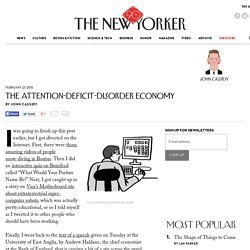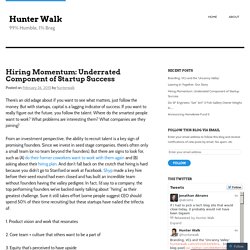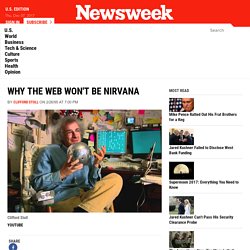

Startup Success = Hiring Momentum, Future of Mobile, Innovator's Dilemma Explained, Meerkat Launch, 1995 Newsweek Article About The Internet. The Attention-Deficit-Disorder Economy. I was going to finish up this post earlier, but I got diverted on the Internet.

First, there were those amazing videos of people snow-diving in Boston. Then I did an interactive quiz on Buzzfeed called “What Would Your Puritan Name Be?” Next, I got caught up in a story on Vice’s Motherboard site about extraterrestrial super-computer robots, which was actually pretty educational, or so I told myself as I tweeted it to other people who should have been working.
Finally, I went back to the text of a speech given on Tuesday at the University of East Anglia, by Andrew Haldane, the chief economist at the Bank of England, that is causing a bit of a stir across the pond. Titled “Growing Fast and Slow,” it’s a characteristically sharp and erudite discussion of the forces that underpin economic development.
I was keen to read Haldane’s argument, and it turned out to go a good deal deeper than providing mere examples of workers wasting time on social-media sites. Yo, the death of the app, and the future of smartphones. Remember Yo?

Yes, I mean the mobile messenger app that debuted last April, the one whose only function is to send your contacts the word "Yo. " Shortly after popping up in the app stores, Yo raised a cool million in funding, followed by a $1.5 million supplement a few months later. The cash avalanche prompted Sam Biddle of Valleywag to call Yo "proof that truly, money is a pastry puff, a trifle that can be scooped and bent and mushed around without any tethers to reality. " Like so many others, I'd written off Yo as a bad Silicon Valley joke and forgotten about it, until I noticed one of my coworkers had it on his phone.
He explained that a group of devs got together every morning before work to do coffee together. Then it dawned on me. Biddle is wrong. Context is king Nearly everyone scoffs upon first trying Yo. “We learn from each other” — on startups. Hiring Momentum: Underrated Component of Startup Success. There’s an old adage about if you want to see what matters, just follow the money.

But with startups, capital is a lagging indicator of success. If you want to really figure out the future, you follow the talent. Where do the smartest people want to work? What problems are interesting them? What companies are they joining? From an investment perspective, the ability to recruit talent is a key sign of promising founders. 1. 2. 3. Combine those three and you have Hiring Momentum, an underrated and IMO underdiscussed component of startup success and scaling.
Harsh reality is, if you have trouble hiring the problem isn’t with the market, it’s with you. Like this: Like Loading... Understanding How The Innovator's Dilemma Affects You. One of the most influential books of my career is The Innovator’s Dilemma by Clay Christensen.

I cannot recommend it enough for people in the technology or media sectors. Many people bandy about the definitions of “disruptive technology” or “the innovator’s dilemma” without ever having read the book and almost universally misunderstand the concepts. Let me start with Professor Christensen’s definition: “An innovation that is disruptive allows a whole new population of consumers access to a product or service that was historically only accessible to consumers with a lot of money or a lot of skill.” Professor Christensen uses real data from the disk drive industry to make his points. The thesis of the book is that incumbents in markets – especially large and well entrenched markets – seldom survive fundamental technology changes in their industries.
But understanding the framework rather than just thinking “those dumb fucks don’t get it” is very useful for thinking about how markets evolve. Why the Web Won't Be Nirvana. After two decades online, I'm perplexed.

It's not that I haven't had a gas of a good time on the Internet. I've met great people and even caught a hacker or two. But today, I'm uneasy about this most trendy and oversold community. Visionaries see a future of telecommuting workers, interactive libraries and multimedia classrooms. They speak of electronic town meetings and virtual communities. Baloney. Consider today's online world. Keep up with this story and more by subscribing now What the Internet hucksters won't tell you is tht the Internet is one big ocean of unedited data, without any pretense of completeness. Won't the Internet be useful in governing? Point and click:Then there are those pushing computers into schools. Then there's cyberbusiness.